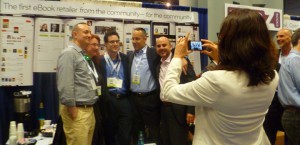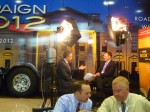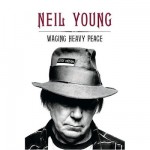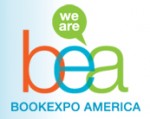Greeting Japanese Visitors at BEA, June 7
 A few weeks ago, publishing friend, Kay Ohara–who like me, once worked for the Japanese publisher Kodansha–emailed me with this question: “I’m playing the role of tour guide for a group of Japanese booksellers/ publishers. Their main interest is e-books . . . I was hoping you can give us a chance to ask what you’ve seen happening in the US book industry? Any time you can spare on June 7 at Javits?”
A few weeks ago, publishing friend, Kay Ohara–who like me, once worked for the Japanese publisher Kodansha–emailed me with this question: “I’m playing the role of tour guide for a group of Japanese booksellers/ publishers. Their main interest is e-books . . . I was hoping you can give us a chance to ask what you’ve seen happening in the US book industry? Any time you can spare on June 7 at Javits?”
I happily agreed, made a note in my calendar, and forgot about it until yesterday when I got a text from Kay. “Are you at Javits? The delegation is having lunch right now. I wanted to know if you can meet with us in an hour or so.” Delegation–hmm? I thought. Fortunately, I wasn’t booked and we agreed to meet near the Bowker booth, at an entrance to the convention floor. I figured from there we could go find a few chairs outside in the food court, and I would try to answer their questions.
When I arrived, I saw that the group was much larger than I’d imagined, almost twenty men and women. Where was I going to take them? How would they hear me? What would I say to them? Luckily, I remembered that Kay is an excellent interpreter, so at least I had that going for me. Also lucky was the fact that next to the Bowker booth is a wide, common area, sort of a pass-through between two parts of the convention floor, with a kind of garage door and iron pillars to one side. I sized up the setting and moving with my back to this barrier, encouraged them to gather round in a semi-circle in front of me. I nodded to Kay and told her I’d offer them a quick rundown of my bookselling and publishing career, so they would understand my perspective on the business, after which I’d take their questions. I gave them my background in brief two-minute bursts, with Kay translating each segment–from Undercover Books, through the eight publishers I’ve worked for as an editor, with a special emphasis on my five years from 1992-97 with Kodansha America–when with my colleague Minato Asakawa, we created the Kodansha Globe series, devoted to cross-cultural titles, and the many Japanese and American colleagues I had then, such as Asakawa-san, Chikako Noma, daughter of the company’s president, and the late and dearly missed Leslie Pockell–on up through to my present days as curator and writer of this blog, independent editor, author representative, and consultant to such publishing enterprises as Speakerfile.
As Kay–who nowadays works as a publishing reporter for Japanese publications–had mentioned, their questions were largely about ebooks and I explained how they’ve reshaped and are continuing to reshape the U.S. book market. They asked me about author advances, and how the emergence of ebooks have affected them (on average, lowered them, I said); how print runs have been affected (ditto); and whether the majority of four-color printing for U.S. publishers is still being done in China (not sure, was my candid reply). At one point during the discussion, while Kay was interpreting something I’d said, I noticed several in the group were taking pictures of me. I took out my digital camera and began taking pictures of them, in a quick, panoramic continuum. The gallery of photos below is the spontaneous result.
Before we were finished, I distributed a handful of the 4×6 black&white postcard that Kyle and I’d had printed as a handout for BEA, and a fistful of my business cards. Soon, they were giving me their cards too, and we enjoyed a few minutes of very mannerly bowing and high-spirited exchanges of reciprocal good wishes for one another, with Kay providing introductions. The half-hour I spent with these foreign guests was a happy and diverting interlude on the final afternoon of BEA, a cross-cultural exchange I’m very glad I had the chance to be a part of, thanks to Kay Ohara, and her delightful “delegation.”
[Click through to see all photos.]







